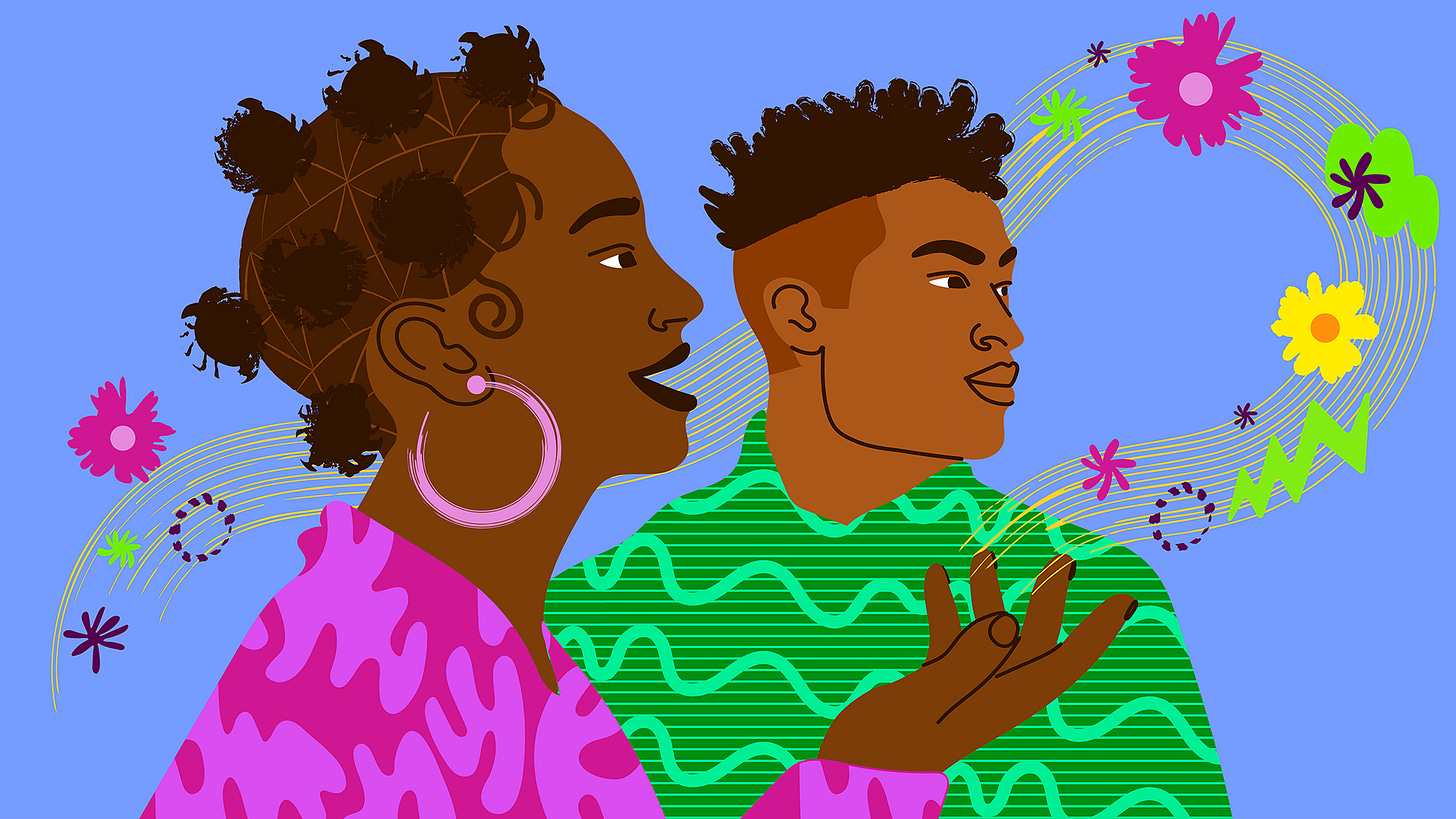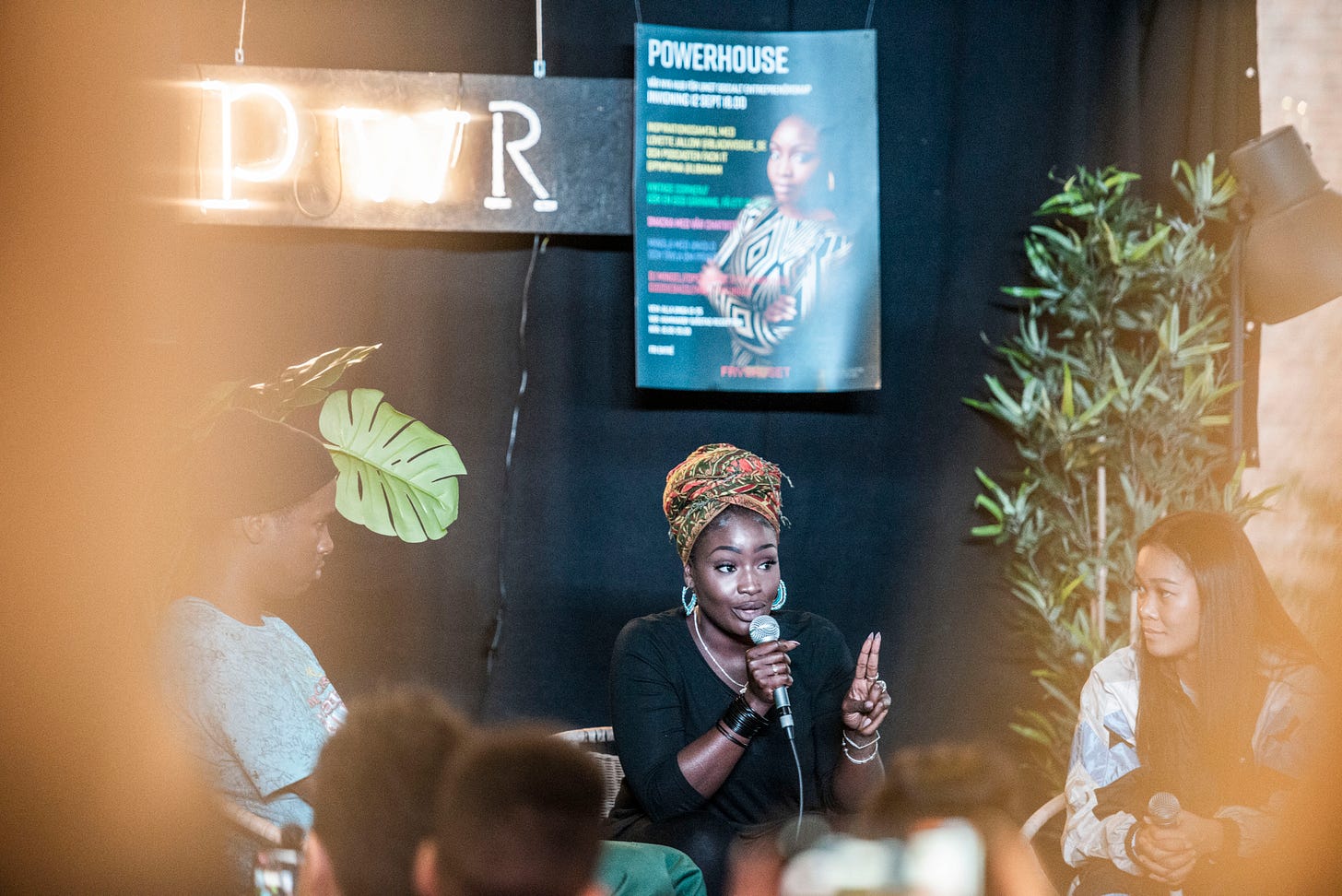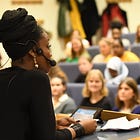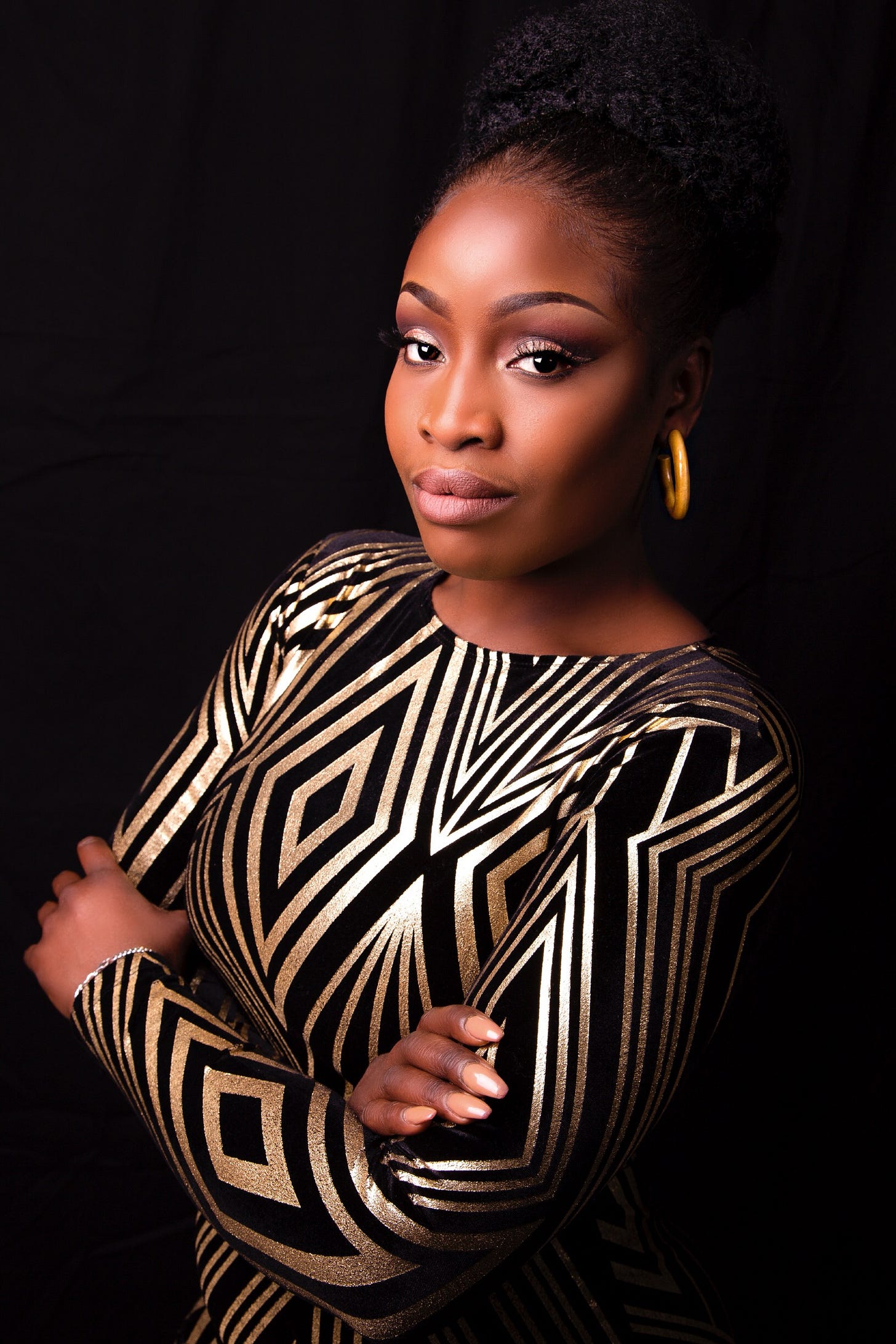When White People Use Autism to Justify Their Racism
How whiteness weaponizes neurodivergence to avoid responsibility, silence Black autistic voices, and uphold racial double standards.
Being Diagnosed Autistic as a Black Woman Across Three Continents
I didn’t get to self-diagnose and be believed. I had to prove myself on three continents.

I know what it costs to be taken seriously as autistic. Not the aesthetic of autism. Not the neurodivergence they romanticize when they want to look interesting. The formal, clinical, contested, pathologized label that shapes every institutional encounter after it lands on your file.
I didn’t get the luxury of self-diagnosing and having people believe me at my word. I had to fight for recognition. I was first diagnosed in the UK in my 20s by a doctor who didn’t really see me. I didn’t know how to self-advocate yet. I masked everything that felt unsafe to reveal. He wrote it up clinically but left me no tools to understand myself. No language to claim my difference without shame. So I hid it.
It wasn’t until s later, when a Black doctor recognized what I was carrying and pushed for a proper assessment, that I could even begin to say it out loud.
I write about this in my book and also in my authortalk which is in english here:
In Sweden, I had to start over again. Multiple assessments. Interviews. School records dissected. Teachers describing me as defiant, angry, difficult. I had to prove I wasn’t a threat—just different. Even then, getting help wasn’t guaranteed.
When I tried to access ADHD medication in Sweden, the gatekeeping was relentless. I needed an American Black doctor to back me, to vouch for the legitimacy of my diagnosis—because my own words weren’t enough.
I went as far as seeking evaluation from that same American-trained doctor in Gambia. Because I needed to know I wasn’t just being misread through Europe’s white gaze. I wanted to know it was true across contexts, across languages, across continents. I needed confirmation not for them, but for me.
Three diagnoses. Three continents. Because being Black and autistic means being told you’re lying even when you have the receipts.
And then there’s the other kind of diagnosis. The one white people perform without credentials. Without invitation. They told me I was the problem in three countries.
Not in clinical rooms but in private messages, comment sections, friend groups. They said, “You’re so direct. That’s autistic, you know.”
They said it not to help me understand myself but to undermine what I said about their harm. They said it to recast my clarity as dysfunction. To claim my refusal to flatter them was pathology. Because whiteness loves to diagnose you when it needs to shut you up.
They didn’t see my autism when I needed support. They saw it when they needed an excuse to ignore me.
It’s not lost on me how hard they fought not to see me when I needed care, only to claim expertise over me when they needed cover. They refused to acknowledge my neurodivergence when it meant accommodating me. But they were eager to assign it to me when it meant dismissing me.
That’s the plausible deniability of whiteness. Pretend they don’t see race when you’re asking for justice. Suddenly see every aspect of your mind when you’re naming harm. This happens all the time. And it’s why I don’t trust their confessions of confusion anymore.
Because confusion is only ever confessed when it’s useful. When it buys them time. When it buys them sympathy. When it buys them the right to keep harming you without consequence.
How Whiteness Uses Plausible Deniability to Avoid Accountability

Whiteness doesn’t disappear when it’s ignored. It reorganizes itself around your refusal to name it. - Lovette Jallow
Whiteness depends on plausible deniability. It needs to maintain power while insisting it has no power at all. One of the core strategies of whiteness is distancing itself from whiteness as an identity, so that individuals can reject accountability for collective, systemic advantage.
This distancing is not accidental. It is socialisation. White people are taught to see themselves as “just people”—neutral, unraced, objective. By insisting on individualism over group identity, they avoid the discomfort of admitting that safety, opportunity, and authority come not purely from merit but from belonging to a racial caste system designed to benefit them.
When confronted with this, many white people resist by reframing privilege as a personal attack on their moral character. Admitting to having whiteness feels like admitting to being racist. To protect their self-image as “good people,” they deny the system itself. They say they “don’t see race,” or claim they “don’t align with whiteness,” as if ignoring it makes its power vanish.
This isn’t personal ignorance. It is a strategic avoidance that preserves the system. Because if whiteness is acknowledged as a structure of privilege, there is an expectation to do something about it. To dismantle it. Many opt for disengagement over responsibility.
They also know that if they do engage, they risk losing social capital, friends, jobs, reputations. So silence and denial become forms of self-preservation.
When denial fails, whiteness has another script ready: weaponized fragility. Tears, confusion, claims of being attacked or misunderstood shift the focus away from the original harm and onto their own feelings. The victim and perpetrator switch places in the story.
And it is precisely this script of reframing harm as confusion or inability that is the root and foundationnof how whiteness weaponizes neurodivergence.
We see it when white people claim “I’m just autistic” to excuse cruelty, bias, or aggression. The same distancing logic applies: “I can’t be responsible for this harm because I’m not capable of understanding it the way you do.”
It is the same plausible deniability in a new form. The diagnosis becomes an alibi. Instead of examining how whiteness shapes their interpretation of social cues, their sense of threat, their authority to define harm—they frame themselves as too literal, too sensitive, too neurologically incapable to be accountable.
But the power imbalance remains. Because whiteness ensures that their self-diagnosed confusion is treated with patience, understanding, and grace—while Black and brown neurodivergent people are criminalized for ours.
This is why whiteness and neurodivergence must be examined together. Not because neurodivergence is inherently harmful, but because whiteness is skilled at using any available tool—including diagnosis—to avoid responsibility for harm.
Ignoring this dynamic doesn’t erase it. It entrenches it.
How White People Weaponize Autism Diagnoses to Evade Accountability
This is a lived experience. But many of you have witnessed it online so let’s name it.
Whiteness is practiced. It learns the language of harm reduction and uses it to shield itself from accountability. And one of the most insidious forms I’ve faced is white people invoking their autism, adhd or any other diagnosis to shut down any conversation about the harm they caused.
Autism as an Excuse for Racist or Harmful Behavior
I’ve lost count of the times I’ve seen a conversation about harm turn into a performance of confusion.
Someone posts something inaccurate about anti-Blackness or neurodivergence. I correct it calmly, with evidence. The response?
“I’m autistic. I struggle with tone.”
Or:
“I’m autistic, I take things literally.”
As if that explains erasing Black scholars, belittling my lived experience, or lying about private conversations in public. Whiteness thrives on its beneficiaries' cultivated ignorance of their history, leveraging that ignorance to evade responsibility for harm.
Weaponizing Autism Diagnoses to Excuse Harm
Survivors know what it is to explain away harm to protect the person who caused it. I used to do that reflexively.

I used to do it too. I’d explain away what they did, rationalize the harm to make it easier for them to hear. It used to take me weeks to unlearn that.
Now? It takes 48 hours. And then I stop overexplaining. I name what happened. I close the door on the performance. Healing isn’t soft. But neither was what we survived.
Because harm isn't softened by shared labels. Sharing a neurotype doesn't mean sharing risk, consequence, or power.
I won't overexplain for them anymore. I won't let them use our supposed sameness to erase the difference in how we're treated.
Healing isn't polite. It's refusal even when it comes from someone who studied our language, sought proximity, copied our frameworks to gain trust—only to use them as weapons when called out.
Case Study: When Neurodivergence Becomes a Weapon
If your neurodivergence only shows up when you’re being held accountable, it’s not a disability—it’s a strategy
I won’t say her name. She doesn’t deserve the reach.
She was someone who followed Black activists online, repeated our words about anti-racism and neurodivergence, fetishized our presence. She wanted the glow of proximity. But when faced with clear evidence of harm she caused? She didn’t apologize. She didn’t even reflect.
She said: “I’m autistic. I take things literally.”
As if that explained it.
I responded: “So I’m allistic, I guess?”
It’s laughable, because she followed me for my autism work. For my advocacy. For the resources I built as a Black autistic woman. She remembered my neurodivergence when it made her feel safe, seen, and informed. But she forgot it entirely when accountability arrived.
Because here’s the part that matters:
I’m autistic too. Formally diagnosed. Thrice. Across 3 continents. After fighting through racist systems that didn’t want to see me. After having to prove and re-prove what was true about me, just to be taken seriously.
She is white, self-diagnosed, insulated.nThis is not an attack on self-diagnosed autistics. Many of us start there. I did advocacy for that. I honor that path. But this isn’t about self-diagnosis.
It’s about how whiteness performs neurodivergence without responsibility. How the label becomes a shield instead of a tool for repair.
Even when faced with receipts. Even when the harm was spelled out.
If you’re wondering what the harm was: it’s not a mystery. I detailed it elsewhere. She not only refused accountability after being confronted, but fabricated stories about me and posted them in other people’s comment sections until it reached me. The actual record of our conversations, the evidence, showed what happened. So I shared it privately with the people she lied to.
That was when the autism excuse appeared.
No apology. Just deletion of social media.
I’ve faced this pattern before. Over and over. As a public person, I’m familiar with how people will weaponize my race against me the second I show evidence. How neurodivergence and gender get used to evade accountability, even when we both share those identities.
Because that’s the final truth here:
For some, being neurodivergent becomes a script to never be wrong.
I didn’t get the choice to remain undiagnosed. I had to fight to be seen. And then I fought for others.nShe used the same label to avoid being accountable for harm she chose to cause within a community she nestled herself into.
That’s not community. That’s convenience for her.
And I’ve survived far worse than her. But I’m done surviving people like her.

Real-Life Examples of Autism Used to Avoid Accountability
White women are taught to make harm look like confusion. And when that fails, they call it autism
Below are just some of the many real, anonymized examples I’ve experienced in the last month alone.
One white woman, a self-proclaimed anti-racist, would routinely repost my autism advocacy work without credit, repackaging my words for her audience. When I confronted her—politely, privately, with receipts—her response wasn’t accountability.
She cried.
She said:
“I’m autistic. I didn’t know and why are you so mean your work is getting shared. ”
As if that explained the choice to erase my voice. As if neurodivergence made her unable to see the “repost” button or my name on my own words.
Another white woman I engaged with publicly used “I’m neurodivergent” as a blanket justification for dismissing anti-Blackness when it was pointed out.
She didn’t ask questions. Didn’t clarify. Didn’t pause. She made it my job to manage her emotions about being corrected.
When she was finally pressed to apologize, she said:
“I didn’t know. I’m autistic. I can’t help it.”
No commitment to change. No examination of impact. Just a strategic retreat into confusion that let her keep her self-image intact.
This is the cultural conditioning of whiteness, gendered through white womanhood:
They’re trained to maintain social control through perceived vulnerability.
They know their distress will shift the focus from what they did to how they feel about being told they did it.
Neurodivergence is the perfect tool for this deflection when whiteness wants cover.
White women are taught to make harm look like confusion. And when that fails, they call it autism
Because ableism ensures people will rush to protect them from discomfort.
Because anti-Blackness ensures that Black neurodivergent people who name harm are read as aggressive, unfeeling, cruel.
This is why it’s not enough to name neurodivergence without naming whiteness.
Because the same socialisation that teaches white women to center their emotions over harm done also teaches them to wield diagnosis as an excuse.
It’s not that they are incapable of understanding.
It’s that they have been taught they don’t have to.
How the DSM Harms Black Autistic People Through White Norms
The baseline it measures against is always white, Western, and middle-class.
Why Autism Diagnoses Are Racially Biased
The DSM was not delivered from on high as a universal truth. It was written in rooms of mostly white, Western men defining normality in their own image.
Diagnosis is not just description. It is power. It decides whose mind is disordered. Whose difference is pathologized. Whose behavior needs to be surveilled or controlled.
Autism Criteria Exclude Black and Brown Neurodivergent People
It’s not that we aren’t autistic. It’s that the diagnostic gaze is racialized.
When autism and ADHD criteria were developed, they centered white children’s behavior, speech patterns, and social cues.
Black and brown children were consistently underdiagnosed, misdiagnosed, or labeled as defiant and aggressive instead of divergent.
In the US, Black children were more likely to receive “emotional disturbance” or “oppositional defiant disorder” labels than autism, despite exhibiting similar behaviors (Mandell et al., 2007).
Latinx and Indigenous children face similar under-diagnosis.
Even in Sweden, the myth of egalitarianism doesn’t erase bias. Racialized children are framed as “unintegrated” or violent rather than as needing support for neurodivergence.
The DSM and White Privilege: Who Gets to Claim Autism?
The DSM has always evolved through politics and cultural pressure, not just science.
Homosexuality was once classified as a mental disorder (Drescher, 2015). It was removed only after protest and organizing forced the profession to see its own bigotry.
What gets defined as disordered is shaped by those who hold power.
Today, white people can use diagnosis as an alibi.
“I’m autistic, I didn’t mean - then comes whatever harm they have caused”
They do so from inside a system built to see their difference as legitimate while criminalizing ours.
The Racial Double Standard in Autism Diagnosis
When white people invoke their neurodivergence to avoid accountability, they cash in on a history that offered them nuance, complexity, and grace.
Black and brown neurodivergent people don’t get that luxury.
We are called aggressive. Oppositional. Violent.
We don’t get to say “I didn’t understand” without risking punishment, criminalization, or social exclusion.
Addressing Whiteness Is Essential in Autism Conversations
This is why neurodivergence cannot be discussed without talking about whiteness.
Because the entire diagnostic framework was built to see them—and to disappear us. So when whiteness uses diagnosis as a shield, it repurposes a system designed to criminalize our difference while excusing theirs.
The DSM wasn’t built to understand us. It was built to define us as problems, protecting the privileges of white supremacy while pathologizing our difference.
And none of this is abstract—it lands in the excuses they use and the harm we’re forced to carry
Citations (in this section)
• Mandell, D. S., et al. (2007). Racial disparities in the identification of children with autism spectrum disorders. American Journal of Public Health, 97(3), 493–498.
• Drescher, J. (2015). Out of DSM: Depathologizing homosexuality. Behavioral Sciences, 5(4), 565–575.
• American Psychiatric Association. (2013). Diagnostic and Statistical Manual of Mental Disorders (5th ed.).
• Jonathan Metzl. (2010). The Protest Psychosis: How Schizophrenia Became a Black Disease.

The Hidden Costs of White People Using Autism to Avoid Accountability
Let’s talk about what it costs us.
Because when whiteness uses diagnosis as an alibi, Black and brown neurodivergent people pay the price for their plausible deniability.
We’re the ones forced to explain—over and over—what harm is, why it matters, why it isn’t wiped away by confusion or tears.
We’re expected to hold the discomfort they refuse. To manage the emotional fallout of being the one who names it.
That’s emotional labor whiteness demands on autopilot. Because the script says we’re the aggressive ones. If we’re clear, we’re harsh. If we set a boundary, we’re cruel. If we ask for accountability, we’re unreasonable. Our calm explanations get called confrontational. Our grief gets read as anger. Our anger gets criminalized.
Being neurodivergent doesn’t protect us. It exposes us. They see our bluntness as a threat, not honesty. Our sensory overwhelm as volatility, not difference. Our need for clarity as defiance, not communication. We’re not read as autistic. We’re read as dangerous.
That’s the anti-Blackness baked into the diagnostic system itself—and into the social responses that follow us everywhere.
When white neurodivergent people use their diagnosis to avoid accountability, they’re trading on the assumption that their confusion is innocent. Deserving of care, patience, second chances.
We don’t get that grace. Our confusion is a problem to fix. Our difference is a pathology to control. Our resistance is a crime. This is why naming harm isn’t safe for us. Because the power imbalance doesn’t disappear when neurodivergence is acknowledged. It just reorganizes around it. They get sympathy. We get surveillance. They get misunderstanding. We get punishment. They get to be complicated. We get to be disciplined.
Their diagnosis buys them grace. Ours buys us suspicion.
Demanding Real Accountability from White People Who Weaponize Autism

We can’t talk about neurodivergence without talking about accountability.
Because accountability isn’t just personal. It’s embedded and structural.
And until whiteness stops using diagnosis as a shield, Black and brown neurodivergent people will keep paying the cost for the harm it refuses to name.
No More Alibis for White Harm
I’m done pretending confusion is neutral. I’m done explaining harm to people who already know how to avoid owning it. I’m not here to soothe their guilt so they can avoid doing the work. Because whiteness depends on forgetting. It counts on our exhaustion, our need for peace, our fear of being cast as the aggressor. It counts on us choosing silence so they don’t have to choose accountability.
But I refuse to participate in their forgetting. I refuse to collude in the lie that confusion is innocent when it is strategic. That tears are unplanned when they are practiced. That diagnosis is just a truth when it is wielded as a weapon.
This is what accountability actually demands: Not an apology that centers your discomfort. Not a confession that disappears once it’s made. Not a promise to “learn” while continuing to harm. Accountability is naming the harm. Acknowledging the impact. Repairing what you can. Changing what you do next.
So I’m not offering comfort here. I’m being very clear. Because whiteness will keep doing what it’s trained to do unless someone says no. No to the alibi. No to the re-centering. No to the weaponized diagnosis.
Questions for you to think about:
What would it mean to hold yourself responsible even when it’s uncomfortable?
What would it mean to stop protecting your innocence more than you protect those you harm?
What would you do if you couldn’t hide behind your confusion?
Work With Me: Inclusion Strategy, Keynotes, and Critical Conversations

In addition to writing, I work internationally as a neurodivergent inclusion strategist, keynote speaker, and consultant.
I help organizations move beyond surface-level diversity initiatives to create environments where neurodivergent, disabled, and marginalized individuals are genuinely supported.
If your organization, collective, or institution is ready to rethink accessibility, inclusion, and systemic accountability, you can book me for:
Lectures
Keynote speeches
Panel discussions
Workshops and trainings
🔹 Book me: lovettejallow.com
🔹 Contact: Lovette@Lovettejallow.com
Explore More from The Lovette Jallow Perspective
You can find more of my essays exploring:
Neurodivergence, autism, and navigating public life as a Black woman
Building true inclusion beyond checkbox diversity
Reclaiming voice and agency across personal, political, and historical landscapes
Racism in Sweden and systemic injustice
Each essay connects real-world experience with structural analysis—equipping individuals and institutions to think deeper, act smarter, and build sustainable change.
Who is Lovette Jallow?
Lovette Jallow is one of Scandinavia’s most influential voices on systemic racism, intersectional justice, and human rights. She is a nine-time award-winning author, keynote speaker, lecturer, and humanitarian specializing in:
Neurodiversity and workplace inclusion
Structural policy reform
Anti-racism education and systemic change
As one of the few Black, queer, autistic, ADHD, and Muslim women working at the intersection of human rights, structural accountability, and corporate transformation, Lovette offers a uniquely authoritative perspective rooted in lived experience and professional expertise.
Her work bridges theory, research, and action—guiding institutions to move beyond performative diversity efforts and toward sustainable structural change.
Lovette has worked across Sweden, The Gambia, Libya, and Lebanon—tackling institutional racism, legal discrimination, and refugee protection. Her expertise has been sought by outlets like The New York Times and by leading humanitarian organizations addressing racial justice, policy reform, and intersectional equity.
Stay Connected
➔ Follow Lovette Jallow for expert insights on building equitable, neurodivergent-affirming environments.
🔹 Website: lovettejallow.com
🔹 LinkedIn: linkedin.com/in/lovettejallow
🔹 Instagram: instagram.com/lovettejallow
🔹 YouTube: youtube.com/@jallowlovette
🔹 Twitter/X: twitter.com/lovettejallow
🔹 Bluesky: bsky.app/profile/lovettejallow.bsky.social











i just posted a note yesterday about how the autistic "sense of justice" symptom is phrased poorly and ignores that autistic people can be bigoted just like everyone else (along with, "why in the world do you want your diagnosis and political affiliation linked!?"). your discussion invites me to add that this idea that autistic people are inherently superhero freedom fighters always pursuing justice not only ignores the actuality of this symptom (extreme rigorousness and sense of self morality), it makes autistic people who follow this dogma, particularly white autistic women, seal off any room for self reflection.
i could have a whole conversation about the everything involved in this mess... antipsych, racist diagnostic criteria, how overlooked low support needs autism is in communities of color, how autism is WAY more common than we think it is, etc... for now though, there's an essay on here about viewing autism as an asymmetric bifurcation (like being left handed). i don't know if you have seen it yet but it's informed a lot of my view now about how autism does (or in our constructed world, doesn't) fit into everything around us. https://open.substack.com/pub/larivierre/p/what-if-the-dsm-5-got-autism-wrong
thank you so much for your work!
It would seem you have yet another banger on your hands. I feel like this same sort of manufactured symmetry of our situation to neurodivergence in different communities happens with queerness as well and I'm like ... I don't remember the last time gay white women were considered not human, were raped, worked to literal death and mass murdered to the tune of millions of people for 400 + years. All while ~ literally every ~ single society conditioned their people to think they were on the bottom of the "hierarchy of human value" as a universally accepted tradition to justify the theft of everything that is our birthright extending from psyches, minds, bodies, potentials to minerals in our native lands. These false conflations and distorted symmetries reduce the magnitude of our situation and ion like that.